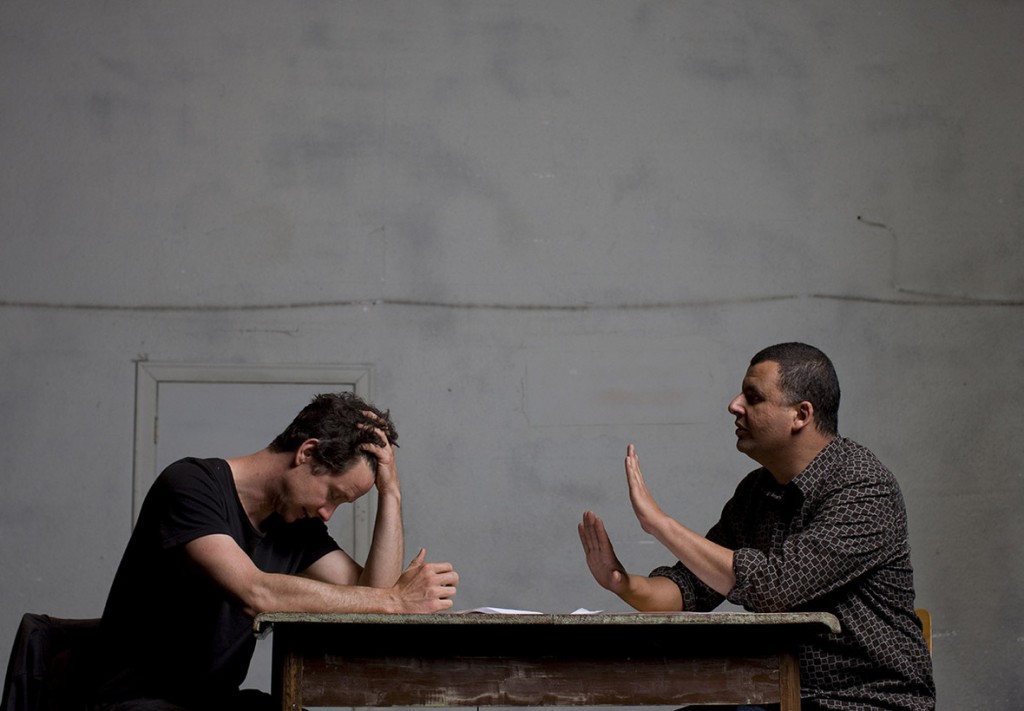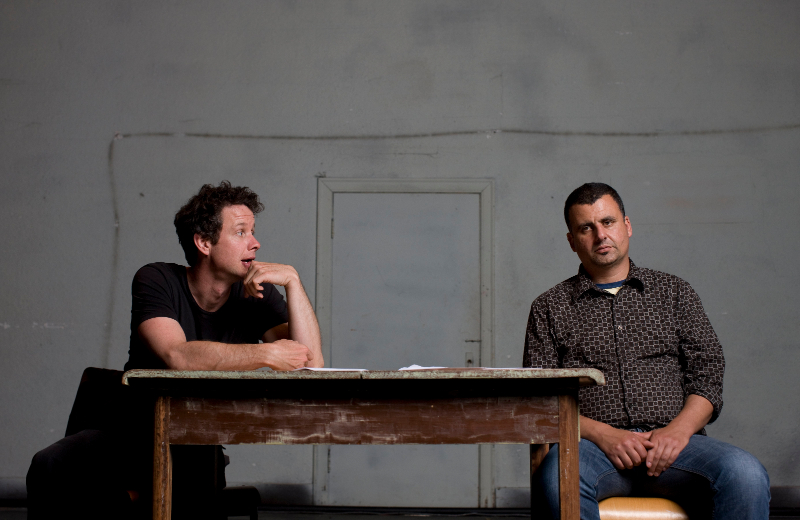
Credit: Simon Hayter
At The Cultch until February 27, 2016
604-251-1363/thecultch.com
Posted February 19, 2016
James Long and Marcus Youssef haven’t killed each other yet. And that’s pretty amazing since they have been publicly insulting each other since November 2012 when Winners and Losers premiered in Gateway Theatre’s Studio B. Actually, they’ve probably been insulting each other – or ‘engaging’ each other – for years before that. That’s the kind of guys they are: smart, funny, articulate, good naturedly confrontational and good friends. Or so they say.
In a recent CBC interview, they said they thought their friendship had deepened as a result of Winners and Losers, which has now toured from Victoria to Montreal and internationally to Brighton, Reykyavik, Aarhus, Dublin, Terni, Seattle, Berlin, New York and Washington. That’s a lot of confrontation. Are they running out of material? Absolutely not. They’re still dishing the dirt.
Written and performed by both of them, this kind of edgy theatre comes naturally to them. James Long, in collaboration with Maiko Bae Yamamoto, makes up Theatre Replacement (BIOBOXES, Clark and I Somewhere in Connecticut) whose mandate it is to provide theatre experiences that are “authentic, immediate and hopeful.” Marcus Youssef is the artistic director of Neworld Theatre (Leftovers, How Has My Love Affected You?), a company committed to addressing “political responsibility, identity and difference”.

Credit: Simon Hayter
So: two guys, two chairs, one long table, two little bells. They start by drawing a chalk square around the set – a sort of ‘ring’ inside which they will engage like a couple of prizefighters. All that’s missing is a referee and a screaming crowd.
Directed by Chris Abraham, it starts in a friendly, playful way. Winner or loser: “Branding.” “Collecting data on foreign house purchases in Vancouver”. “Canada.” “Microwave ovens” turns up the heat: Long thinks they’re a winner: safe and easy to use. Youssef thinks they’re losers and accuses Long of having “a little Fukushima in your kitchen out of which you feed your two little children”. Uh oh. After each engagement, Youssef and Long ring their bell, declaring, “Winner” or “Loser”.
It gets much more personal. And nasty. But politely.
Long comes from a working class family. His father, with whom he had pretty much no relationship, left when Long was a teenager. Life hasn’t been easy. Youssef comes from wealth; his father left Egypt when Youssef was a kid and he built up a fortune, part of which Youssef will inherit. His dad bought him a car. He owns a nice home. Life is good.
This, finally, is the source of Long’s envy – bordering on hostility – and Youssef’s defensiveness – bordering on apologetic.
Winners and Losers is scripted to the extent that this is where Youssef and Long will end up: an impasse. But through the course of the evening, they’re free to throw out for discussion whatever they want. Trump. Stephen Hawking. Mexico. Masturbation. It changes nightly.
Long is wired and fidgety. His feet are twitchy. He leans in. Frowns. Leans back. Smiles patronizingly. It’s a game. Youssef sits still. He furrows his brow. He appears puzzled then smiles. When he laughs, we really feel it.
At some point, we begin to fear for them.
Maybe they’ll realize their differences don’t matter. Maybe they won’t. Tension grows over eighty minutes and we really don’t know where they’ll end up. It could get ugly – and that’s the risk we’re all taking with each performance. Will this be the night they finally lose it?
It’s a bold and risky thing they’re doing – although it has gone on so long in so many venues we think it’s probably safe to say they won’t get really vicious. The serious point they’re making is this: we all live with differences. How tolerant are we able to be? What’s at stake? World peace.
Can their friendship survive such openness? So far, so good.
Long? Winner. Youssef? Winner. Ding!

